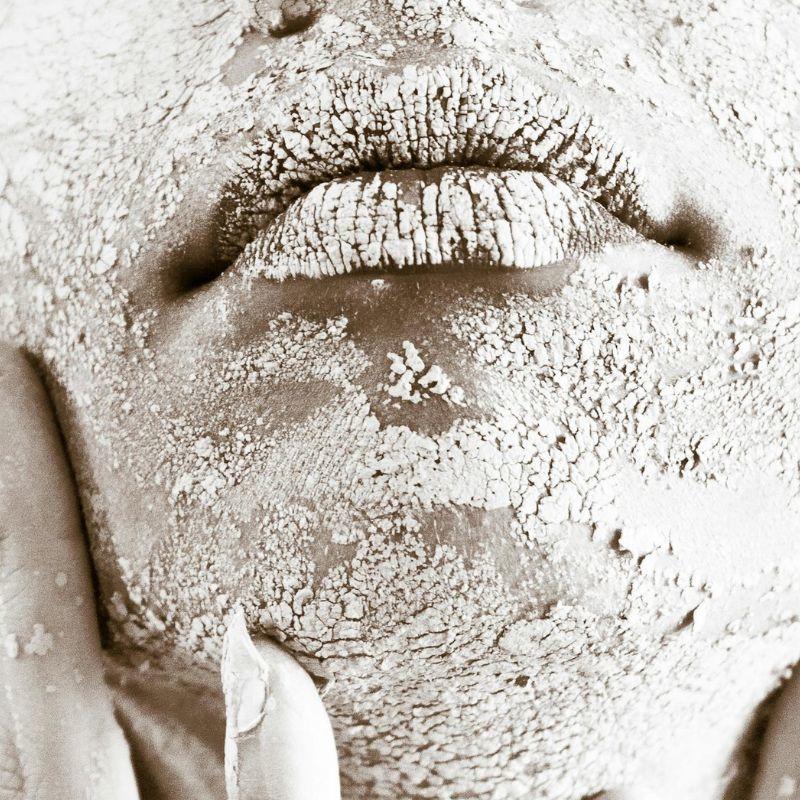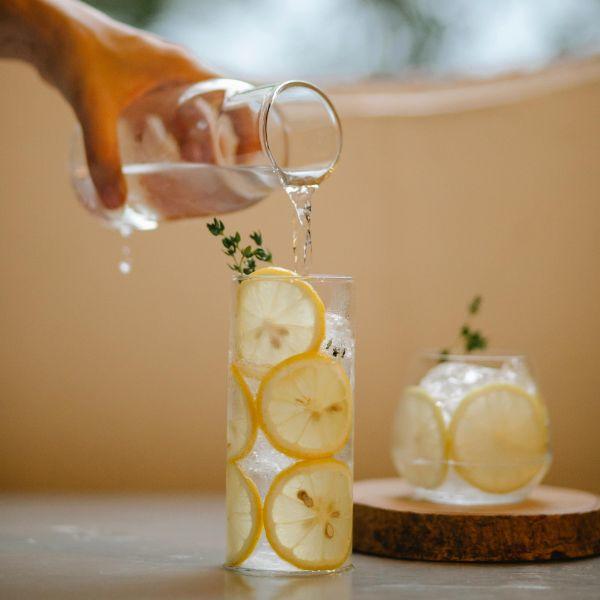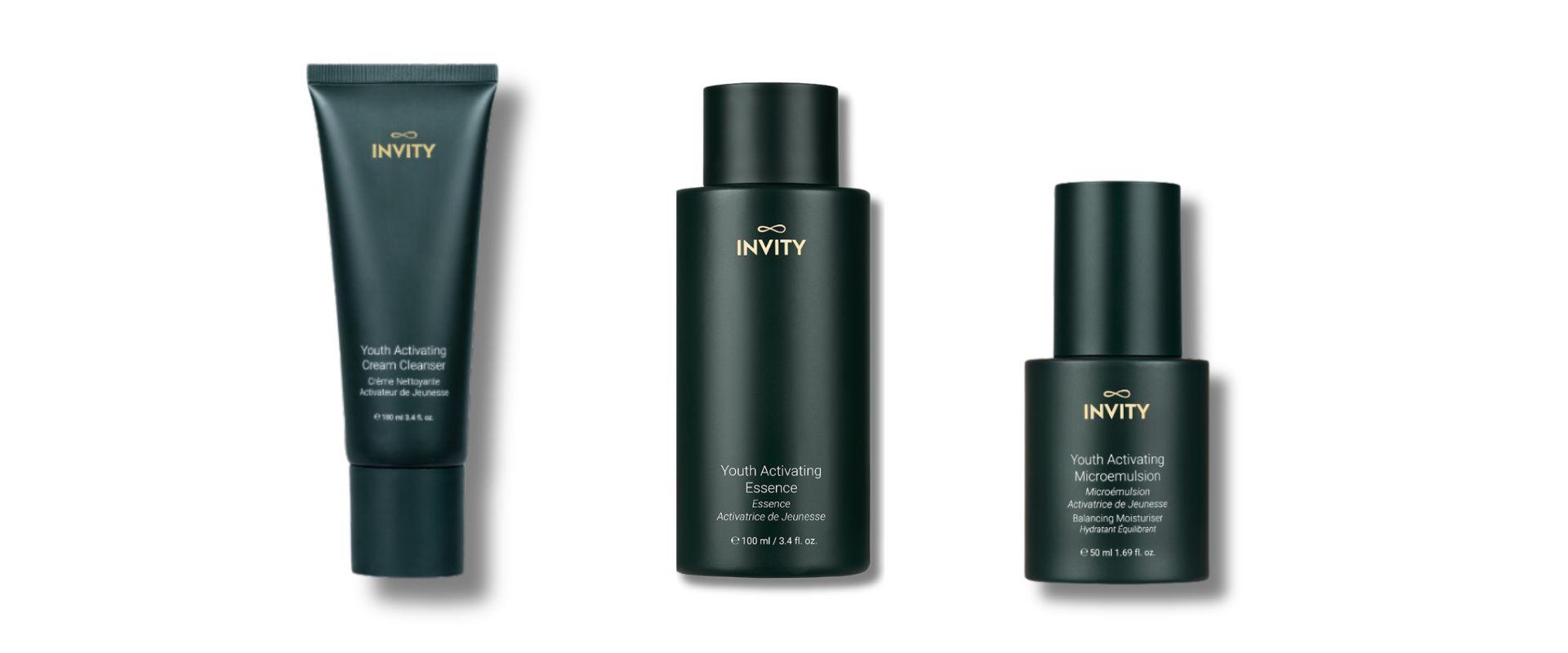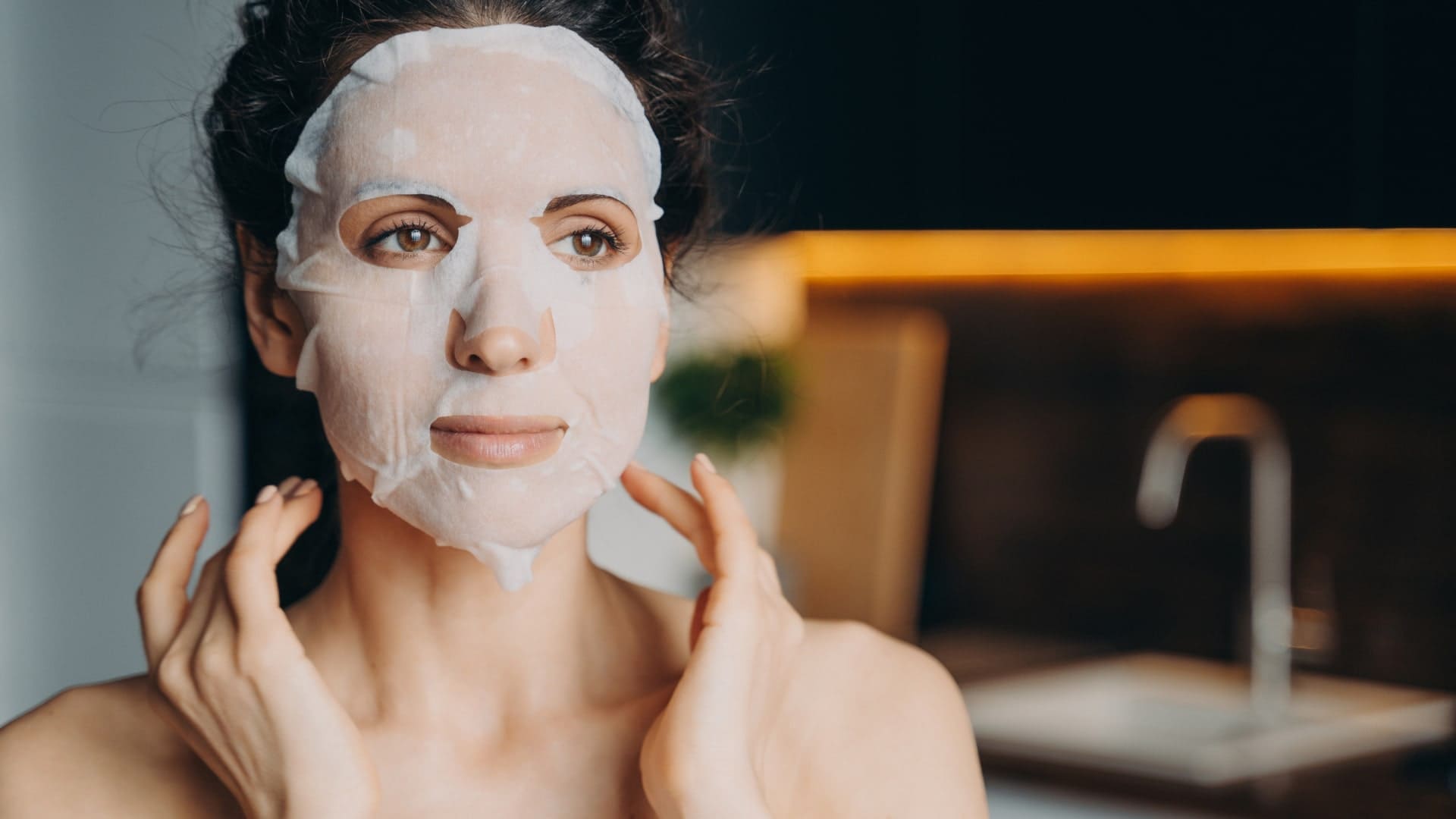Dehydration vs. Dry Skin: Decoding the Difference
Posted by Invity on 5th Jun 2024

- When it’s in perfect homeostasis, skin cells are able to produce and maintain the essential elements vital for its health, including collagen and elastin, its firmness and elasticity building blocks.
- Hydrated skin is also better at maintaining cell turnover (the shedding of old dead skin cells to reveal fresh, smooth, plump skin beneath). In other words, it helps skin maintain its bouncy, firm, smooth, radiant and more youthful appearance.
- Think of your skin barrier as your body’s hydration guardian and homeostasis helper. When healthy, this fine layer of lipids (skin oils or fats like ceramides) and skin cells forms an invisible shield over the skin to protect it against external aggressors such as irritants or viruses, and it prevents moisture loss by stopping water escaping. But here's the catch – it's not invincible. Ageing, hormones and lifestyle choices can all take a toll on your skin's barrier, leaving you high and dry, literally.
- Hydration also plays an important role in regulating oil production, which can help alleviate acne and excess shine.
- This allows your skin to become dehydrated, so it feels and looks tight and uncomfortable.
- It causes it to produce even more oil to stop the dehydration.
- This can also trigger irritation or sensitisation.
- Use gentle skin care products, and look for nourishing, fragrance-free moisturisers to help.
- Consider using a humidifier during the winter and applying a hydrating mask at least once a week.
- If you are struggling with severe dryness and irritation, especially eczema and psoriasis, see a skin doctor to help manage your skin.
- We all know that hydration helps to keep skin plump and moisturised, but how much is enough? That’s up for debate, and much depends on your sex, pregnancy, illness, the climate, whether you’re exercising and perspiring heavily (when you need more), and so on.
- Most medical experts believe that women need to take in between 6 to 9 cups of fluid a day. For active men, it’s about 13 cups.
- Remember, this recommended intake includes not only drinking water, but should also factor in hydrating foods rich in water content, such as fruits, vegetables and soups. So drink (and eat) enough of the right fluids: water, caffeine-free tea, antioxidant-rich vegetables and fruit, broth.
- If you’re feeling thirsty, then you’re probably already dehydrated. But it can also be dangerous to over-hydrate, which can cause its own health issues. If you’re unsure about what’s right for you, speak to your doctor.
- Take a good-quality omega-3 oil supplement, preferably fish oil, to help boost those essential fatty acids that build the skin barrier.
- It offers intense hydration, nourishment, protection and comfort: It captures water with humectant glycerine and trehalose, softens and soothes skin with emollient olive oil extracts, mango seed butter, jojoba extract and vitamin E, while occlusive ingredients form a barrier film to prevent TEWL, strengthening, hydrating and protecting skin.
- It also tackles your skin-ageing concerns:
 A potent blend of humectants (starring sodium hyaluronate, the salt form of hyaluronic acid) and hydrating ingredients like prickly pear extract and tamarind seed gum work in harmony to attract and retain moisture, boosting skin hydration by 194% in just 15 minutes.
A potent blend of humectants (starring sodium hyaluronate, the salt form of hyaluronic acid) and hydrating ingredients like prickly pear extract and tamarind seed gum work in harmony to attract and retain moisture, boosting skin hydration by 194% in just 15 minutes.- The biodegradable banana-fibre sheet masks ensure maximum moisture retention over a long time.
- Innovative NAD technology boosts cellular energy, with intense repair and renewal effects.
- Antioxidants and other plant extracts help to rejuvenate the skin, leaving it plump, radiant, and revitalised. Who’s it for?
Dehydrated skin and dry skin are often confused, but they are distinct skin concerns with different causes, and addressing their needs requires both hydration and moisturisation. Once you understand these differences, you will be able to give your skin the care it needs.
While they're related, hydration involves increasing the water content in the skin, while moisturisation is all about trapping and sealing in moisture to build and protect the skin’s natural barrier.
Get the lastingly radiant, healthy, dewy and youthful complexion we all want with our expert insights, and moisturisation and hydration hacks (Hint: there are delicious creams and sheet masks in your future).
Key Topics
Dehydration vs. Dry Skin: Decoding the Difference
Signs of Dehydrated Skin
Signs of Dry Skin
Dehydrated Skin
Why Is Skin Hydration Important?
What Causes Skin Dehydration?
What About Dehydration and Oily Skin?
Dry Skin
Dry Skin Causes
Dry Skin Tips
Solutions for Dehydrated and Dry Skin
Your Good Hydration and Moisturisation Hacks
Maintaining Hydration from Within
Outside-In Hydration and Moisturisation
YOUR SKINCARE ESSENTIALS
The Skin-Nourishing Specialist
The Hydration Specialist
Dehydration vs. Dry Skin: Decoding the Difference
What Is Dehydration?
Dehydration is a skin condition, not a skin type, that refers to a lack of water in any skin. Even oily skin can be dehydrated.
Hydration is your secret weapon in the pursuit of a healthy body, not to mention skin that performs to its full potential.
What Is Dry Skin?
Dry skin, on the other hand, is a skin type (like oily or combination skin), and it's mostly genetic. Known medically as xerosis, it is caused by a lack of oil and other moisturising factors in the skin. And, as we discuss below, skin can become dry due to certain other factors.
.
| Signs of Dehydrated Skin | Signs of Dry Skin |
|---|---|
| Appearance | Appearance |
|
Dull, lacklustre complexion
Fine lines, wrinkles, especially around eyes and mouth Ashy skin tone |
Dull complexion
Roughness Flakiness, scaly texture Cracks in severely dry skin |
| Sensation | Sensation |
|
Tightness, discomfort
Increased irritation, redness, itching |
Tightness
Redness, irritation |
| Effects | Effects |
|
Excessive oil production to
compensate for dehydration, leading to oily or combination skin More visible pores
Reduced elasticity, skin feels less
|
Itchiness
Sensitivity Skin infection Skin ages prematurely |
.

Image: Pexels.com/Mariana Montrazi
DEHYDRATED SKIN
Why Is Skin Hydration Important?
The water in our bodies is important to help it perform all its vital functions. It helps to regulate our body temperature and keep the body in homeostasis – a stable balance that allows the body, its organs and cells to function properly.
When it comes to skin, hydration is not just about its looks. As our body’s largest organ, our skin is naturally affected by the body’s hydration levels. When we overheat, the water in our skin is released as perspiration to help our body cool down.
Of course, water’s also essential for maintaining skin health, function and beauty:
What Causes Skin Dehydration?
The first thing to understand is that any skin, even the oiliest, can become dehydrated.
The culprits that can contribute to skin dehydration by stripping skin of its natural moisture:
Ageing: The skin barrier can become compromised as we age and our hormones change. Less oestrogen = less oil production, resulting in drier skin and wrinkles.
Environmental factors: harsh weather conditions, like hot summers, freezing winters with windchill.
Our lifestyle habits: these include smoking, living with central heating or air conditioning, and hot showers.
Skincare practices: using harsh cleansers that strip our skin barrier, overuse or incorrect use of ingredients that can potentially irritate the skin, such as aggressive retinoids, exfoliating acids, benzoyl peroxide, and so on.
Our diet: drinking alcohol, too much caffeine, high-salt foods.
Seasonal hydration challenges: In autumn and winter, cold temperatures and low humidity levels can suck moisture from the skin, leading to dryness and flakiness. While summer heat and sun exposure can cause dehydration and sun damage.
By adjusting your skincare routine to accommodate seasonal changes, you can maintain optimal hydration year-round.
.
Any skin, even the oiliest,
can become dehydrated
What About Dehydration and Oily Skin?
As strange as it may seem, oily skin can still become dehydrated because of a lack of water. This is often caused by our attempts to control excess oil.
It is very tempting to use harsh treatments to remove every trace of oil that’s making skin shiny and feel congested. Sure, it feels matte and fresh… for about five minutes. But, unfortunately, when you do this, you strip its protective barrier:
The solution: Find a good, gentle skincare range that helps to normalise your skin’s oil production without stripping the barrier.
Please use a moisturiser to help maintain good hydration – just make sure it is oil-free and absorbs excess oil.
DRY SKIN

Image: Pexels.com/Ricardo Garcia
Dry Skin Causes
Water retention isn't the issue with dry skin. People who have dry skin don't produce enough of their own moisturising lipids (oils) and other factors. They are often born that way, and eczema, psoriasis or atopic dermatitis are also caused by severe dryness.
Other causes of dry skin:
Skin ageing: The decline in oestrogen during and post-menopause in mature skin. This affects both skin moisturisation and oil production, so skin becomes both drier and more dehydrated.
Environmental factors: Cold and hot weather, central heating and air conditioning can dehydrate the skin and strip it of protective oils.
Hot baths and showers: Prolonged exposure to hot water can remove the skin’s natural oils.
Frequent washing: especially if using harsh, oil-stripping soaps and detergents.
Some medications: diuretics, antihistamines and retinoids can cause dry skin.
Nutritional deficiencies: poor intake of essential fatty acids, vitamins (especially vitamin A and vitamin D), and minerals.
Medical conditions: diabetes and hypothyroidism can affect the skin's moisture levels.
Dry skin tips
To prevent and manage dry skin, the solution lies in using products that moisturise continuously and effectively lock in that moisture, particularly at night. This helps maintains adequate hydration levels and well-moisturised is less itchy, so you don’t scratch, which can cause infection.
SOLUTIONS FOR DEHYDRATED AND DRY SKIN
Your Good Hydration and Moisturisation Hacks
Maintaining ideal skin hydration and moisturisation requires a multi-faceted approach.
It is important to hydrate and moisturise the body from the inside out – through your diet. It’s equally important to hydrate skin from the outside in – through the right skincare.
.Maintaining hydration from within

To stay well hydrated, women need
6 to 9 cups of fluid a day
Active men need about 13 cups
.
Outside-in hydration and moisturisation
Invest in moisturising and hydrating skincare products tailored to your skin type and concerns.
Look for the words ‘hydrating’, ‘moisturising’ and ‘nourishing' on skincare products. Study their ingredients to find the best one for you.
Moisturisation
Moisturising products help prevent TEWL (water loss), protect the skin barrier, and maintain the skin's softness and smoothness.
You will need:
Emollient ingredients, such as plant oils like avocado and squalene, fatty acids and ceramides, which fill gaps between skin cells, with a softening and smoothing effect.
Occlusive ingredients, like petrolatum, beeswax and silicone (dimethicone), form a protective barrier film on the skin’s surface to prevent water loss.
Hydration
Hydrating products make skin more plump and elastic, smoother and radiant.
Humectant ingredients, like hyaluronic acid, glycerine, lactic acid, aloe vera and urea, help increase the water content within the skin. They do this by attracting water from the environment and the deeper layers of the skin to the outermost layer (stratum corneum), absorbing many times their own body weight of water.
Protection
Look out for peptides and antioxidants, which can help protect and repair the skin from free-radical damage and improve skin elasticity.
Your Skincare Essentials
Always use a gentle, non-stripping cleanser. It can have a mild exfoliating action with fruit acids, as long as it has other ingredients that protect the skin barrier. Our recommendation: Youth Activating Cream Cleanser
Prime your skin. Our Youth Activating Essence bathes skin in soothing moisture as it primes it for products that follow, to give you a radiant, even-toned complexion. NAD, calming, barrier-enhancing polysaccharides, and a mannose-6-phosphate complex replenish energy, boost collagen production, and provide deep hydration for plumper, softer, and more serene skin.
Light moisturising emulsions. Their lighter fluid textures offer good hydration for daytime use, for oily, normal-to-combination and young skins. And they are ideal in warmer weather, spring and summer. Our recommendation: Youth Activating Microemulsion

The skin-nourishing specialist
Dry skin will lap up a rich cream moisturiser like our incredible Youth Activating Cream Concentrate.

Fights glycation and improves skin firmness and elasticity as it targets visible ageing signs including sallowness, age spots, and wrinkles.
Expect all-day moisture and comfort and rejuvenated, radiant skin.
Who’s it for?
The richer texture is excellent for dry skin, night-time, for those with drier skin or mature skin, and for harsh, cold and windy climates and winter.
Boost skin hydration by 194%
in just 15 minutes
The Hydration Specialist
Hydrating serums and facial masks are the super-hydration specialists, giving skin an intensive moisture injection. They can be used several times a week, at change of season, and whenever your skin needs a deep moisture boost.
We’re proud of our specialist hydration magician. As the ultimate hero of our hydration story, SuperNAD Youth Activating Facial Sheet Mask is the year-round game-changer for restoring moisture, radiance and vitality to your skin.

What makes SuperNAD Youth Activating Facial Sheet Mask different to other facial sheet masks?
This is not your simple, average instant-gratification facial mask. Think of it as a high-tech spa day in a packet. Its highly effective blend of active ingredients have serious skincare benefits for lasting skin transformation:
It is ideal for all skin types, all seasons and all climates. If you have tired-looking, dull, mature, dry or dehydrated skin, and want to improve the appearance of fine lines and wrinkles while boosting skin radiance and plumpness, this deliciously nourishing and pampering sheet mask is for you.
.
Ready to give your skin the moisture and comfort it richly deserves?
Our Moisturise & Nourish Essentials Kit gives you Youth Activating Essence, Youth Activating Cream Concentrate and Youth Activating Facial Sheet Mask all together at a very special price.
Your Glow Up Secret, Inside and Out
There you have it – with this insider knowledge, you'll be well on your way to a complexion that glows with health and beautiful hydration. Here’s to looking fabulous!